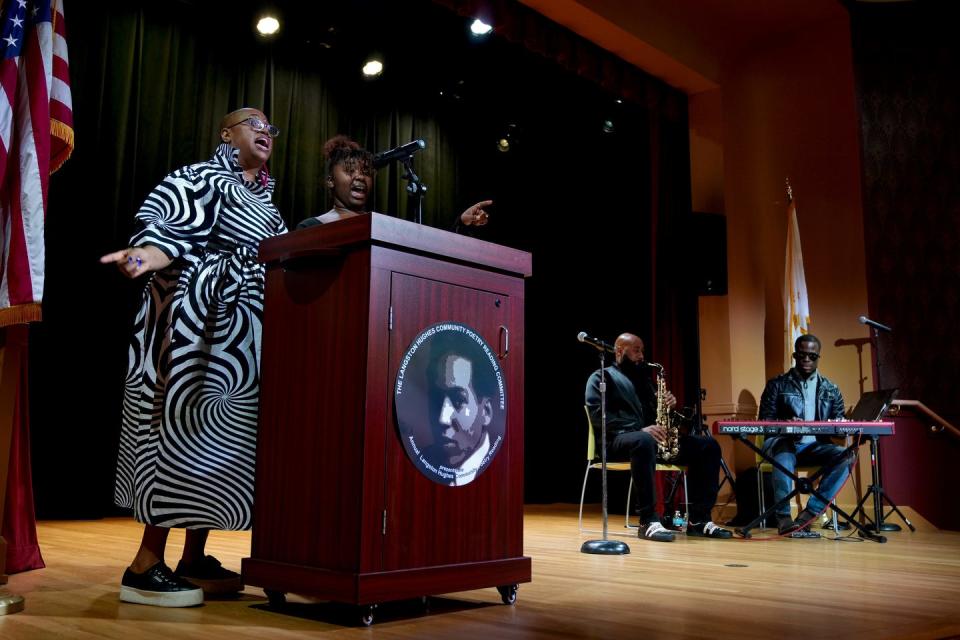Black storytelling is an art form. For 25 years, this group has been sharing it with RI
Like many stories, this one started when a "what if" collided with an opportunity.
It started in 1998. Valerie Tutson was immersed in the storytelling community, but most especially in the Black storytelling community. She was working at UCAP School in Providence, and she wanted the kids to hear stories and storytelling. And then, when she came back from a trip to South Africa, she heard the Rhode Island Foundation had put out a call for grant applications to fund exactly the sort of project she had been thinking about.
"I went to Ramona Bass's house (Ramona Bass Kolobe) ... and I said, 'Ramona, there's money. What if we pulled the Black storytellers together? And what if we do a festival?'" Tutson said.
From there, they started making calls to people like Len Cabral and Rochelle Coleman, and the Rhode Island Black Storytellers (RIBS) and Funda Fest, an annual storytelling festival that takes place every January, was born. Twenty-five years in, they've told thousands of stories to adults and students all around Ocean State, creating a platform to show the power and diversity of Rhode Island's Black community.
"When you hear someone's story, you start to understand them better. You gain empathy and compassion, and that's what we try to do as storytellers," Cabral said. "There's lots of things we can do to help society through storytelling."
What Rhode Island Black Storytellers has meant for the schools
A quarter of a century after the group coalesced, Tutson is starting to enjoy the "incredible" feeling of seeing first-hand the impact of the work.
Tutson recently took a storyteller to Paul Cuffee Middle School in Providence. When the principal, a Black woman, introduced the storytellers, Tutson recalled her saying, “‘I remember when RIBS came to my school, and I saw myself on stage for the first time, and I knew I could be anything I wanted to be, and I want that for you."
"It was an incredible moment," Tutson said.
Cabral said he hears it all the time now, too.
'The day is ending': Emmanuel Baptist, open for nearly a century, will close this month
The group is keenly aware of the lack of diversity within the profession, which means most students don't often see Black people at the front of the classroom.
"It's important to be seen," Cabral said.
And, in a world that's full of screens and pressure, there's also something mesmerizing about having someone's full attention and listening to a story, with lessons that cross cultures we can all learn from.
"I was at a school yesterday with kindergartners. As soon as they can sit up, someone is putting a device in their hands these days," Tutson said. "But they were captivated ... We're wired for storytelling. It engages our imagination."
What Funda Fest has done for the community
Funda Fest has always been an expression of culture and joy.
"We were like let's call it the Funda Festival because it means to learn (in Zulu), because it's our most ancient way for storytelling, and it looks like fun," said Tutson.
The January festival is in the tradition of Black storytelling, with drums, music, poetry and audience engagement. And every year, it showcases the breadth of the Black experience — storytellers from different countries, stories of joy, folktales, stories about history — by bringing it all to the stage.

"The best part is being able to invite people that we know are really good storytellers," Cabral said. "Rhode Islanders really enjoy them, and they carry a message many people want to hear."
'Failure is not an option': How a Black-owned tattoo shop thrives in Rhode Island
It's become "our gift" to the community, Tutson said.
What's next for Rhode Island Black Storytellers
In some ways, Tutson said, RIBS still feels like a new organization. It was only two years ago that they were able to afford their first full-time employees.
The next project is creating a Black storytelling leadership academy, having won $50,000 in prize money from the Social Enterprise Greenhouse Nonprofit Innovation Lab. The goal is to help nurture and empower new storytellers to find their voices by creating a culturally based storyteller training program.
This article originally appeared on The Providence Journal: RI Black Storytellers put Black culture center stage 25 years

